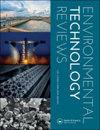A review of the role of pre-treatment on the treatment of food waste using microbial fuel cells
Q1 Environmental Science
引用次数: 8
Abstract
ABSTRACT Food waste is primarily managed by incineration or disposal in landfills. These current management methods can result in adverse environmental effects, are expensive, and do not necessarily take advantage of the remaining energy potential in food waste. Alternative treatment technologies such as microbial fuel cells (MFCs) are an attractive disposal method since overall organic concentrations can be reduced, and some of the chemical energy of the food waste can be transformed into electrical energy. MFC research has focused on the use of liquid waste due to advantages such as easy handling, low internal resistance, and efficiency of ion transfer in the liquid phase. While some researchers have shown the potential of using complex solid waste as a direct fuel in MFC, there remain significant challenges for optimizing complex solid food waste-fed MFCs. In particular, the biological degradation of the complex substrates in food waste is a slow process and requires additional pre-treatment (physical, thermal, chemical, or biological) to degrade complex biopolymers efficiently. As such, this article aims to review the impact and importance of various pre-treatment methods for optimizing performance of food waste fed MFCs. It is clear that direct use of solid waste in MFCs can be promising if several factors are optimized, including the pre-treatment used, substrate biodegradability, and operational cost. Although low power output is one of the main obstacles in the commercialization of MFC, MFC can still be considered a viable, self-sufficient treatment method to treat waste with minimum to zero emissions. GRAPHICAL ABSTRACT前处理技术在微生物燃料电池处理食物垃圾中的作用综述
食物垃圾主要通过焚烧或填埋的方式处理。目前的这些管理方法可能会对环境产生不利影响,成本高昂,而且不一定能利用食物垃圾中的剩余能源潜力。微生物燃料电池(MFCs)等替代处理技术是一种有吸引力的处理方法,因为总体有机浓度可以降低,而且食物垃圾的一些化学能可以转化为电能。由于其易于处理、内阻低、液相离子转移效率高等优点,MFC的研究一直集中在废液的利用上。虽然一些研究人员已经展示了使用复杂固体废物作为MFC直接燃料的潜力,但在优化复杂固体食物垃圾喂养的MFC方面仍然存在重大挑战。特别是,食物垃圾中复杂底物的生物降解是一个缓慢的过程,需要额外的预处理(物理、热、化学或生物)来有效地降解复杂的生物聚合物。因此,本文旨在综述各种预处理方法对优化mfc食物垃圾性能的影响和重要性。很明显,如果几个因素得到优化,包括使用的预处理、基质的生物降解性和运营成本,在mfc中直接使用固体废物是有希望的。虽然低功率输出是MFC商业化的主要障碍之一,但MFC仍然可以被认为是一种可行的、自给自足的处理方法,可以以最小到零排放的方式处理废物。图形抽象
本文章由计算机程序翻译,如有差异,请以英文原文为准。
求助全文
约1分钟内获得全文
求助全文
来源期刊

Environmental Technology Reviews
Environmental Science-Water Science and Technology
CiteScore
6.90
自引率
0.00%
发文量
8
 求助内容:
求助内容: 应助结果提醒方式:
应助结果提醒方式:


